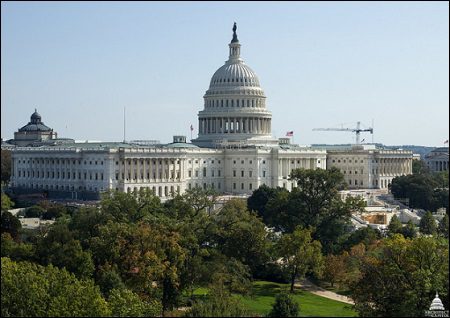A coalition of 34 national business, labor and transportation industry groups – including the American Association of State Highway and Transportation Officials – called on congressional budget writers to take steps to fix the Highway Trust Fund as they craft a fiscal 2018 budget that would take effect Oct. 1.
In April 7 letters addressed to the leadership and copied to all members of Senate and House budget committees, the industry groups urged those lawmakers to start a process to make sure the trust fund, or HTF, can avoid running out of money after the current surface transportation law expires in 2020.
In that 2015 Fixing America’s Surface Transportation Act, Congress authorized and paid for modest annual increases in the trust fund’s highway and transit programs.
However, the groups wrote, “there will be a nearly $20 billion average annual shortfall between existing revenue and the amount needed to prevent cuts in highway and public transportation investment once the FAST Act expires.”
The letter signers, which also included the U.S. Chamber of Commerce, National Association of Manufacturers, American Road & Transportation Builders Association and American Public Transportation Association, repeatedly emphasized the importance of transportation investment to the broader economy.
“The HTF’s revenue challenges and the resulting consequences on other parts of the federal budget and U.S. economy warrant a long-term solution to stabilize and grow federal surface transportation investment as part of any tax reform initiative,” they wrote.
They urged lawmakers to include instructions in their fiscal 2018 budget resolution “calling on the relevant tax and authorizing committees to develop legislation to permanently address the trust fund’s structural revenue deficit.”
The industry groups also urged budget writers to include a “reserve fund” clause for the trust fund that would allow the already approved FAST Act investment levels “to increase if additional trust fund resources are generated by tax reform or some other legislative vehicle.”
That reserve fund budget provision could effectively lock in and protect funding for the highway and transit programs if more transportation funding emerges from whatever tax overhaul lawmakers might embrace, or if President Trump’s much-anticipated infrastructure investment package generates more federal revenue into roads, bridges and transit systems.
The groups also warned against falling back into a start-stop project funding pattern that prevailed for years before the FAST Act, with federal funding disruptions that delayed new projects around the country until lawmakers found enough money to pay for short-term HTF extensions.
“Failure to address the HTF’s revenue shortfall as part of a comprehensive measure would increase the likelihood of Congress again shifting funds from elsewhere in the budget to support another in a long string of one-time trust fund infusions,” they wrote. “While such actions have temporarily stabilized highway and transit investment, they do not provide states the certainty needed to implement long-term transportation plans.”
Moreover, “these temporary legislative fixes pass the HTF problem off to another Congress at an increased price tag,” the groups added, while “a long-term, growth-supporting revenue solution for the HTF would achieve many of the economic and fiscal objectives of both parties” in Congress.


